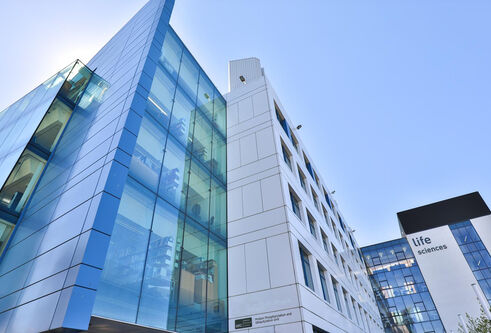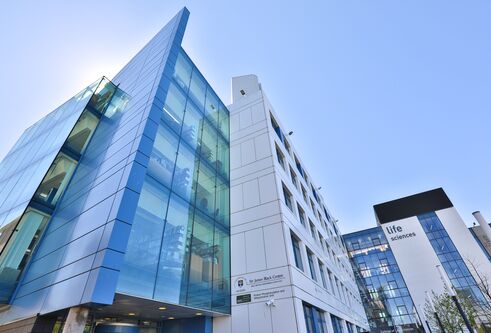Professor Miratul MuqitFMedSci FRSE
Chair of Experimental Neurology (Clinical)
MRC PPU, School of Life Sciences

Contact
Websites
Biography
Miratul graduated in Medicine with Honours from the University of Edinburgh in 1997. He was awarded a prestigious Kennedy Scholarship to study Neurobiology at Harvard University undertaking Huntington’s disease research in Mel Feany’s laboratory in 2001. He obtained his PhD in 2007 from the UCL Institute of Neurology where he made a major contribution to the discovery of PINK1 kinase mutations in Parkinson’s disease under the supervision of Nicholas Wood FMedSci and David Latchman. In parallel, he received clinical training at leading London teaching hospitals including the Hammersmith Hospital and the National Hospital for Neurology and Neurosurgery at Queen Square. He specialized in Movement Disorders training under Andrew Lees FMedSci and Kailash Bhatia.
Miratul joined the MRC PPU as a Wellcome Trust Intermediate Clinical Fellow (Sponsor: Dario Alessi FRS) in 2008 to investigate how PINK1 mutations lead to neurodegeneration in Parkinson’s. He has been a Wellcome Trust Senior Clinical Fellow since 2013 and a Consultant Neurologist since 2011. Miratul has received multiple awards for his research including the Queen Square Prize in Neurology (2006), Goulstonian Lecture of the Royal College of Physicians (2018) and Francis Crick Lecture of the Royal Society (2018). He became a member of the EMBO Young Investigator Programme in 2017, a Fellow of the Royal Society of Edinburgh in 2020 and a Fellow of the Academy of Medical Sciences in 2023. In 2025, Miratul was appointed the inaugural Director of the UK Dementia Research Institute (UK DRI) Parkinson’s Research Centre.
Research
Parkinson’s disease is a progressive disorder of movement and coordination due to the specific loss of dopaminergic neurons in the brain. There are no medicines that can slow or halt the disease process largely due to a lack of understanding of the fundamental mechanisms. Spectacular advances in genetics have identified 13 genes that are mutated in familial forms of the disease and nearly 90 gene variants that increase susceptibility to sporadic disease. Understanding the regulation and signalling networks in which these genes reside is likely to elaborate new knowledge on the key cellular pathways that are vital for maintaining neuronal integrity and health. It may also lead to the development of novel approaches to better diagnose and treat Parkinson’s.
My lab studies the protein kinase, PTEN-induced kinase 1 (PINK1) in which loss of function mutations cause Parkinson’s disease. We are interested in understanding how PINK1 is regulated and how mutations lead to neurodegeneration. Studies to date indicate that PINK1 is a master regulator of a mitochondrial damage response pathway that exists in many different cell types including neurons. Under healthy conditions PINK1 is inactive, however, upon selective mitochondrial stress, PINK1 is activated and stimulates the removal of damaged mitochondrial via autophagy (termed mitophagy) thereby promoting cell survival.
My lab found that PINK1 phosphorylates ubiquitin and Parkin at a Ser residue (Serine 65) located within a conserved fold of ubiquitin and the ubiquitin-like domain of Parkin. We also determined the mechanism of activation of Parkin E3 ligase activity by phosphorylated-ubiquitin. We were able to demonstrate the relevance of our findings to the pathogenesis of Parkinson’s through analysis of a Parkin Ser65Ala knock-in mouse and the discovery of rare Parkinson’s patients harbouring mutations of the Parkin Ser65 site. In collaboration with the van Aalten lab, we solved the first crystal structure of PINK1 using an insect orthologue that has revealed the mechanisms of how disease mutations impact on PINK1 activity. Collectively our work has stimulated interest amongst industry to develop small molecule activators of Parkin and PINK1.
We have also found that PINK1 stimulates the phosphorylation of a subset of Rab GTPases (Rab1B, 8A, 8B and 13) at a conserved Ser residue (Ser111) that lies within the SF3 motif. PINK1 dependent phosphorylation of Rabs disrupts its ability to interact with its cognate guanine exchange factor, Rabin8, and more recently we have found that phosphorylation impairs the ability of another Parkinson’s associated kinase LRRK2 to phosphorylate Thr72 within the Switch II domain.
Outstanding questions include understanding how PINK1 is activated upon mitochondrial depolarisation and determining novel regulatory proteins required for PINK1 activation. We are establishing robust methods to study PINK1 signalling in neurons and defining the downstream biology in these cell types. We are also investigating the mechanisms by which Rab GTPases are regulated by PINK1 activation.
Research Impact
Our research has stimulated interest in exploiting phosphorylation and ubiquitylation mechanisms in Parkinson’s disease for drug discovery. We have active collaborations with industry including Astex Pharmaceuticals and Mitokinin Inc.
We also collaborate with the pharmaceutical industry via the Division of Signal Transduction Therapy collaboration with Boehringer Ingelheim, GlaxoSmithKline, and Merck Serono with the research outputs from my group contributing to accelerating the development of company drug development programmes through access to research data and reagents.
We actively contribute to many public engagement projects including working with school children through the MRC-PPU programme and also artists. We also are leading contributors to the collaboration termed the “Edinburgh-Dundee-Parkinson's-Research-Initiative” that promotes interactions between Parkinson’s researchers, clinicians and patients based in the East of Scotland.
Selected Publications
- Bagnoli, E., Lin Y-E., Burel, S., Jaimon, E., Antico, O., Themistokleous C., Nikoloff, J.M., Morella, I., Watzlawik J.O., Fiesel, F.C., Springer, W., Tonelli, F., Brooks, S.P., Dunnett, S.B., Brambilla, R., Alessi, D.R., Pfeffer, S.R., Muqit, M.M. (2025) Endogenous LRRK2 and PINK1 function in a convergent neuroprotective ciliogenesis pathway in the brain. bioRxiv 2024.06.11.598416. In press Proc Natl Acad Sci
- Raimi, O.G., Ojha, H., Ehses, K., Dederer, V., Lange, S.M., Rivera, C.P., Deegan, T.D., Chen, Y., Wightman, M., Toth, R., Labib, K.P.M., Mathea, S., Ranson, N., Fernandez-Busnadiego, R., Muqit, M.M.(2024) Mechanism of human PINK1 activation at the TOM complex in a reconstituted system. Science Adv 10: eadn7191.
- Stevens, M.U., Croteau, N., Eldeeb, M.A., Zeng, Z.W., Toth, R., Durcan, T.M., Springer, W., Fon, E.A.*, Muqit, M.M.*, Trempe, J-F*. (2023) Structure-based design and characterization of Parkin activating mutations. Life Sci Alliance 6: e202201419
- Antico, O., Ordureau, A., Stevens, M., Singh, F., Gierlinski, M., Barini, E., Rickwood, M.L., Prescott, A., Toth, R., Ganley, I., Harper, J.W.*, Muqit, M.M.* (2021) Global ubiquitylation analysis of mitochondria in primary neurons identifies physiological Parkin targets following activation of PINK1. Science Adv 7: (46) eabj0722
- Singh, P., K., Muqit M. M. (2020) Parkinson’s: A Disease of Aberrant Vesicle Trafficking Annu Rev Cell Dev Biol Aug4. Doi: 10.1146/annurev-cellbio-100818-125512.
Media availability
I am available for media commentary on my research.
Elucidation of the PINK1 signaling pathway in Parkinson’s disease
Contact Corporate Communications for media enquiries.
Areas of expertise
- Alzheimer’s disease
- Medicines
- Parkinson’s disease
PhD Projects
Principal supervisor
Second supervisor
Awards
| Award | Year |
|---|---|
| Fellow of the Academy of Medical Sciences | 2023 |
| Fellow of the Royal Society of Edinburgh | 2020 |
| Brian Cox Prize: Engaged Researcher | 2019 |
| Personal Fellowships / Wellcome Trust Senior Fellowship in Clinical Science | 2018 |
| International Science Prizes awarded since 1990 / Graham Bull Prize in Clinical Science | 2017 |
| National Sciences Prizes awarded since 1990 / Royal Society Francis Crick Medal and Lecture | 2017 |
| National Sciences Prizes awarded since 1990 / Goulstonian Lecture of the Royal College of Physicians (RCP) | 2017 |
| Fellow of Learned Societies and Colleges / Fellow of the Royal College of Physicians | 2016 |
| International Science Prizes awarded since 1990 / European Molecular Biology Organisation Young Investigator Programme | 2016 |
| Personal Fellowships / Wellcome Trust Senior Fellowship in Clinical Science | 2013 |
| Personal Fellowships / Wellcome Trust Intermediate Clinical Fellowship | 2008 |
Stories
Press release
A University of Dundee expert has been appointed to lead a new centre that will drive research to better understand the causes of Parkinson’s disease.

Press release
University of Dundee scientists have discovered a new target that could herald the development of new drugs to treat Parkinson’s disease.

Press release
A project led by scientists at the University of Dundee’s School of Life Sciences and School of Medicine has been selected for the 2025 SPARK NS Translational award, aimed at accelerating scientific discoveries in Parkinson’s disease to reach patients